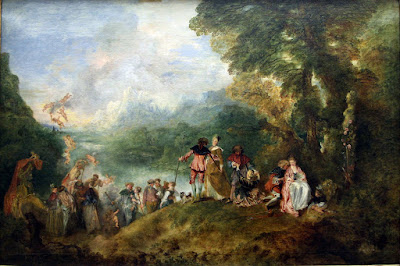 |
| Gustave Caillebotte Les Périssoires 1878 oil on canvas Musée des Beaux-Arts de Rennes |
 |
| Édouard Manet Argenteuil 1874 oil on canvas Musée des Beaux-Arts de Tournai |
 |
| Eugène Boudin Beach at Trouville 1865 oil on cardboard Musée d'Orsay, Paris |
 |
| Edgar Degas Seaside Riders ca. 1860 oil on canvas National Gallery, London |
 |
| Edgar Degas The Parade ca. 1866-68 oil on canvas Musée d'Orsay, Paris |
 |
| Théodore Géricault Start of the Horse Race ca. 1820-23 oil on canvas Musée du Louvre |
 |
| Marie Laurencin The Amazon 1923 oil on canvas Metropolitan Museum of Art, New York |
 |
| Camille Pissarro Haymaking at Éragny 1892 oil on canvas Art Institute of Chicago |
 |
| Camille Pissarro Woman Bathing her Feet in a Brook 1894-95 oil on canvas Art Institute of Chicago |
 |
| Ferdinand de Puigaudeau Le Calvaire de Rochefort en Terre ca. 1895 oil on canvas Musée des Beaux-Arts de Morlaix |
 |
| Ker-Xavier Roussel The Terrace ca. 1892 oil on panel Musée d'Orsay, Paris |
 |
| Hubert Robert Laundresses 1792 oil on canvas Cincinnati Art Museum, Ohio |
 |
| Jean-Antoine Watteau Le Pèlerinage à l'île de Cythère 1717 oil on canvas Musée du Louvre |
 |
| Jean-Antoine Watteau Le Pèlerinage à l'île de Cythère (detail) 1717 oil on canvas Musée du Louvre |
 |
| Jean-Antoine Watteau Le Pèlerinage à l'île de Cythère (detail) 1717 oil on canvas Musée du Louvre |
The Beast in the Space
Shut up. Shut up. There's nobody here.
If you think you hear somebody knocking
On the other side of the words, pay
No attention. It will be only
The great creature that thumps its tail
On silence on the other side.
If you do not even hear that
I'll give the beast a quick skelp
And through Art you'll hear it yelp.
The beast that lives on silence takes
Its bite out of either side.
It pads and sniffs between us. Now
It comes and laps my meaning up.
Call it over. Call it across
This curious, necessary space.
Get off, you terrible inhabiter
Of silence. I'll not have it. Get
Away to whoever it is will have you.
He's gone and if he's gone to you
That's fair enough. For on this side
Of the words it's late. The heavy moth
Bangs on the pane. The whole house
Is sleeping and I remember
I am not here, only the space
I sent the terrible beast across.
Watch. He bites. Listen gently
To any song he snorts or growls
And give him food. He means neither
Well or ill towards you. Above
All, shut up. Give him your love.
– W.S. Graham (1967)
Graham composed this poem twenty years before he died. What he contrived was that it would ripen into the future (instead of fading, as the larger share of the world's work appears doomed to do). This particular poem claims an increasing rather than a diminishing level of vitality because seemingly only just now, when a new reader finds it, has it reached the maturity of meaning which its maker foresaw for it, but could not entirely bestow on it while he remained alive. Graham's precedent here, and possible inspiration, is Keats –
This living hand, now warm and capable
Of earnest grasping, would, if it were cold
And in the icy silence of the tomb,
So haunt thy days and chill thy dreaming nights
That thou would wish thine own heart dry of blood
So in my veins red life might stream again,
And thou be conscience-calm'd – see here it is
I hold it towards you –